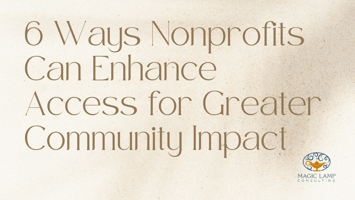In nonprofit organizations, diversity, equity, and inclusion (DEI) go beyond simple buzzwords—they...
Ways to Promote Diversity, Equity, and Inclusion in Your Nonprofit

Diversity, equity, and inclusion (DEI) are more than just buzzwords—they are fundamental principles that should guide the operations and culture of every nonprofit organization. When DEI is woven into the fabric of a nonprofit, it not only enhances the organization’s effectiveness but also ensures that its mission resonates with a broader, more diverse community. For nonprofit leaders, fostering a culture that values and promotes DEI is essential to creating an environment where everyone feels valued and empowered to contribute to the organization's goals.
Here are some practical ways nonprofit leaders can promote diversity, equity, and inclusion within their organizations:
1. Create a DEI Strategic Plan
Just as your organization likely has a strategic plan for achieving its mission, it’s crucial to develop a DEI strategic plan. This plan should include clear goals, measurable objectives, and timelines for implementation. Consider conducting a DEI audit to assess where your organization currently stands. The audit can reveal gaps and opportunities, serving as a baseline for your plan. Once you’ve developed the plan, ensure it’s integrated into your organization’s overall strategy and revisited regularly to track progress.
2. Diversify Your Leadership and Board
The leadership and board of a nonprofit set the tone for the organization. A diverse leadership team can bring a variety of perspectives, experiences, and ideas to the table, which can lead to more innovative solutions and a deeper understanding of the communities you serve. When recruiting for leadership and board positions, be intentional about reaching out to candidates from underrepresented groups. This might involve expanding your recruitment networks, offering mentorship programs to prepare potential leaders, or revising your selection criteria to focus on competencies and lived experiences that align with your DEI goals.
3. Cultivate an Inclusive Organizational Culture
Creating an inclusive culture requires more than just hiring a diverse team—it’s about ensuring that every individual feels valued and included. This can be achieved by promoting open communication, encouraging collaboration, and recognizing the contributions of all team members. Regularly seek input from staff at all levels, and create safe spaces where employees can share their experiences and ideas. Offering DEI training and workshops can also help staff understand the importance of these principles and how they can contribute to an inclusive culture.
4. Develop Equitable Policies and Practices
Examine your organization’s policies and practices through an equity lens to ensure they are fair and inclusive. This includes reviewing hiring, promotion, and compensation practices to identify and eliminate any biases. For example, consider implementing blind recruitment processes to minimize unconscious bias in hiring. Also, ensure that your organization’s benefits and support systems are equitable and accessible to all employees, such as offering flexible work arrangements, family leave, or professional development opportunities that are tailored to different needs.
5. Engage with Diverse Communities
To truly serve your community, it’s important to engage with and understand the diverse populations within it. This involves building relationships with community leaders, attending community events, and actively seeking feedback from the people you serve. By involving diverse voices in your decision-making processes, you can ensure that your programs and services are relevant and responsive to the needs of all community members. Additionally, consider forming partnerships with other organizations that have strong ties to diverse communities, as these collaborations can help you reach a wider audience and strengthen your impact.
6. Measure and Report on DEI Progress
Accountability is key to any successful DEI initiative. Establish metrics to measure your organization’s progress toward its DEI goals, such as tracking the diversity of your staff and leadership, assessing employee satisfaction and retention rates, and evaluating the effectiveness of your DEI programs. Regularly report on these metrics to your board, staff, and stakeholders. Transparency in your DEI efforts not only builds trust but also demonstrates your organization’s commitment to continuous improvement.
7. Foster a Learning Environment
Promoting DEI is an ongoing journey that requires a commitment to learning and growth. Encourage your team to engage in continuous education on DEI topics through workshops, webinars, reading materials, and discussions. Create opportunities for staff to learn from each other by sharing experiences and best practices. A learning mindset helps your organization adapt to changing needs and challenges, ensuring that your DEI efforts remain relevant and effective over time.
8. Celebrate and Recognize Diversity
Celebrating diversity within your organization and the communities you serve can reinforce the importance of DEI. Recognize and celebrate cultural events, holidays, and milestones that are meaningful to your team and community members. This not only shows respect for different cultures and traditions but also fosters a sense of belonging among employees and stakeholders. Additionally, highlight the contributions of diverse individuals within your organization and share success stories that showcase the impact of your DEI efforts.
Conclusion
Promoting diversity, equity, and inclusion in your nonprofit is not a one-time initiative but a long-term commitment that requires ongoing effort and reflection. By embedding DEI into your organization’s culture, policies, and practices, you create an environment where everyone has the opportunity to thrive. This not only strengthens your organization but also enhances your ability to achieve your mission and make a meaningful impact in the communities you serve.
As a nonprofit leader, your dedication to DEI can inspire others and help create a more just and equitable society. Start today by taking small, intentional steps, and over time, these efforts will lead to significant, positive change.




